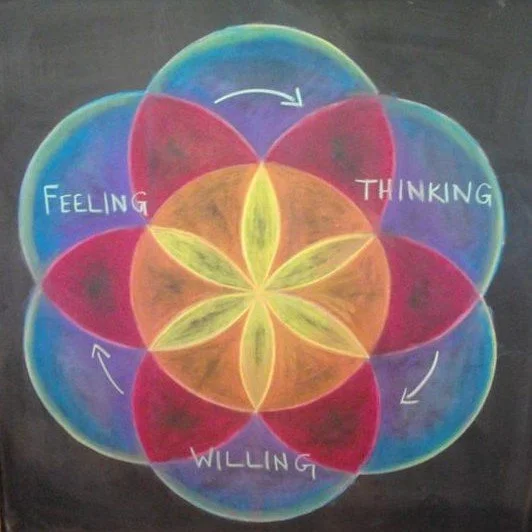Explaining the Characteristics of Waldorf Education
Upper Valley Waldorf School — Education of the future and for the future.
Waldorf Education is the fastest growing independent school movement in the world today, with more than 1,000 Waldorf schools spread across five continents.
Waldorf schools integrate intellectual, artistic, and practical instruction throughout the curriculum. The development of social skills and ethical values are key elements of Waldorf Education, woven throughout the curriculum and every grade level.
Waldorf Education aims to inspire life-long learning in all students — to enable them to fully develop their unique capacities. Some characteristics that distinguish a Waldorf school from other schools include:
The Class Teacher
Loving guidance is essential for children to grow into self-confident and caring adults. Waldorf grades teachers remain with the same class as they progress through the grades. The result is a strong bond between the class and the teacher. This relationship over time allows the teacher to understand the strengths and struggles of students and as they move through the Waldorf curriculum together. The class teacher also becomes a trusted, supportive resource for parents as they work in collaboration throughout these formative years.
Subject teachers
Specialized content rounds out the curriculum in a wide variety of subjects. Many subject teachers work with students in grades one through eight and come to know them well over the years. Subject classes include:
French
Handwork & Woodwork
Strings Class & Chorus
Movement
Painting & Beeswax/clay modeling
Developmental Appropriateness:
At UVWS we recognize that children move through specific stages of development. To best support successful learning, we introduce academic content and subjects at a time and in a fashion appropriate to the child's intellectual and emotional development.
Integrated Curriculum
Students discover multiple and profound connections in their learning as subjects unfold over time. Scientific and mathematical subjects are enhanced and deepened through music and art. History and geography are enriched through practical arts such as handwork and woodwork.
Differentiated Learning
Curricular content is delivered through multiple approaches. Teachers reach different learning styles as they engage children through their senses, through movement, and through artistic expression.
Focusing Attention
Waldorf education encourages children's natural ability to listen and to respond to the human voice. From early childhood throughout all the grades, children memorize songs, poems, tongue twisters, and entire plays by listening to their teachers.
Social Education
Waldorf education fosters and nurtures politeness and courtesy among the children in the classroom and on the playground. We recognize that social conflict is a normal part of human growth, which must be guided rather than avoided. We work to help children learn how to resolve conflicts and come to a greater understanding of oneself and others.
Celebrating 100 years of Waldorf Education
History of Waldorf Education
Waldorf Education is based on the work of Rudolf Steiner, PhD (1861-1925), an Austrian-born philosopher, artist, scientist and teacher. Steiner offered insights into a broad spectrum of human endeavors based on a holistic vision of the human being. Steiner held that, in order for a child’s potential to fully develop, three central aspects need to be addressed: thinking, feeling, and willing. The Waldorf curriculum, initiated in Stuttgart, Germany in 1919, is rooted in a developmental approach that balances rigorous study of the sciences, humanities and artistic subjects. At each stage of the student’s development, academic cognitive skills are mastered through the artistic presentation of content by trained Waldorf teachers through unique, hands-on experiential methodology.
We acknowledge that Rudolf Steiner espoused racist views about racial hierarchy that have been associated with anthroposophy and Waldorf education; we renounce these views, and we declare our intent to be a part of an evolving Waldorf movement that embraces anti-bias in all forms.







